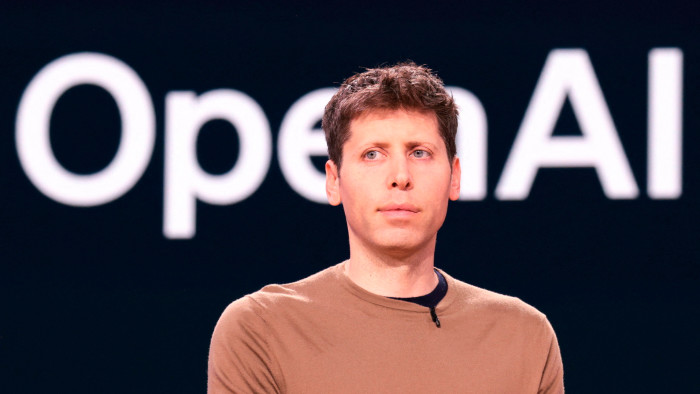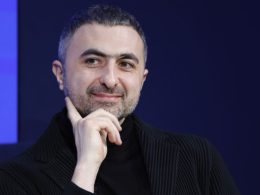One thing to start: The Trump family is building a cryptocurrency empire that’s already brought in more than $1bn in pre-tax profits, an FT investigation has found. Asked whether the FT’s calculations on his family’s profits were broadly accurate, Eric Trump said the true figure was “probably more”.
Another thing: Josh Wander, the founder of 777 Partners, the Miami-based investment and insurance group that attempted to buy Everton Football Club, has been charged with wire and securities fraud by federal prosecutors in New York.
And a big takeover bid falls flat: Spanish lender BBVA has failed in its €17bn hostile bid to take control of Sabadell, securing only a quarter of its rival’s shares in a humbling result for the larger bank’s executives who staked their credibility on a deal.
Welcome to Due Diligence, your briefing on dealmaking, private equity and corporate finance. This article is an on-site version of the newsletter. Premium subscribers can sign up here to get the newsletter delivered every Tuesday to Friday. Standard subscribers can upgrade to Premium here, or explore all FT newsletters. Get in touch with us anytime: Due.Diligence@ft.com
In today’s newsletter:
Venture capital rolls the dice on AI
Is there an AI bubble? Some of the tech world’s top investors think so, but that’s not slowing them down.
VC groups have spent $161bn on AI in the year to date — equal to two-thirds of their total spending. The bulk of that has gone to just 10 groups, whose combined valuation has risen by nearly $1tn, according to calculations by DD’s George Hammond.
Ask Silicon Valley’s moneymen why they’re splashing the cash and many will point to the dotcom era of the late 1990s: while most internet companies of that time crashed and burned, the few that survived won beyond their wildest dreams.
The thing is, the scale of investment in AI is on a whole other level.
VCs ploughed $10.5bn into internet companies in 2000, or about $20bn adjusted for inflation. This year, they’re on course to invest well over $200bn — an order of magnitude higher — into AI companies.
“Of course there’s a bubble,” said Hemant Taneja, chief executive of VC firm General Catalyst. “Bubbles are good. Bubbles align capital and talent in a new trend, and that creates some carnage but it also creates enduring, new businesses that change the world.”
The hope is that the new technology creates its own multitrillion-dollar markets: automated software engineering and AI companionship, to name just two.
But the risks of contagion if things go belly-up are greater this time.
OpenAI, the world’s most valuable private company, has woven itself into the fabric of public markets through deals with AMD, Nvidia, Broadcom and Oracle.
All those groups saw their share prices gain tens or hundreds of billions of dollars after striking deals to provide computing power to OpenAI.
But as DD has noted before, there’s no certainty that OpenAI will get the demand it anticipates, to profit from its enormous spending.
The company earns about $13bn in annual recurring revenue, 70 per cent of which comes from people using ChatGPT, the FT previously reported.
Yet of its roughly 800mn regular users, only 5 per cent are paying subscribers. Its operating loss in the first half of 2025 was about $8bn.
Its hopes — and possibly those of public markets — rest in significant part on the shoulders of one man, OpenAI chief executive Sam Altman.
In the words of Sebastian Mallaby, author of The Power Law: “It comes down to these articles of faith about Sam’s ability to work it out.”
Karel Komárek: the betting billionaire hoping to win big in the US
Karel Komárek made a lot of his fortune running lotteries in Europe. He’s now chasing what he sees as “the biggest opportunity”, on the other side of the Atlantic.
Komárek’s gambling group Allwyn, which operates the UK’s National Lottery, is planning a €16bn tie-up with its Greek subsidiary OPAP to create the world’s second-largest listed gaming group, as DD wrote earlier this week.
The FT’s Stephanie Stacey, Ashley Armstrong, Ivan Levingston and Arash Massoudi have now dug into the billionaire’s past and examined his plans to break into the US.
Komárek, now worth $12bn, was raised in Czechoslovakia but started amassing his fortune after the 1989 Velvet Revolution ended four decades of communist rule. First he sold industrial parts, then he moved into oil and gas.
His first foray into gambling came in 2011 when his investment group KKCG bought the near-bankrupt Czech lottery operator Sazka.
The company rebranded to Allwyn in 2021. It now operates lotteries in seven countries, owns a stake in online sports betting company Betano, and recently acquired US fantasy sports operator PrizePicks.
Komárek rose to prominence in Britain after Allwyn won the right to run the UK’s National Lottery in 2022.
But it hasn’t been plain sailing: the company has been drawn into a bitter court fight between rival National Lottery bidder Northern & Shell and the UK Gambling Commission.
Komárek’s newfound stature has also brought unwelcome attention to his earlier ties to Russian state-controlled energy group Gazprom.
The billionaire’s “grand vision” for his business involves growing in the US — a mission that will probably include further acquisitions.
The business will be going up against sports betting giants DraftKings and FanDuel-owner Flutter. Ascendant prediction markets Polymarket and Kalshi, which now threaten to upend the US gambling industry, are also among Komárek’s competitors.
No pressure.
Job moves
-
Giorgio Armani has promoted its deputy managing director Giuseppe Marsocci to CEO after the death of its eponymous founder.
-
Apollo Global Management has appointed Eiji Ueda as head of Asia Pacific. He succeeds Matt Michelini and was most recently chief investment officer at Japan’s Government Pension Investment Fund.
-
Retail deposit broker Raisin has named ex-NatWest CEO Dame Alison Rose to its supervisory board and as chair of its remuneration committee.
-
White & Case has named Arun Birla and Jiten Tank as partners in London. They join from Paul Hastings.
-
Citigroup has named Roberto Costa and Federico Monguzzi as its investment banking heads in Italy. Gregoire Haemmerle has been appointed vice-chair of UK, Europe and Middle East investment banking.
Smart reads
Split the risk Slicing and dicing debt could, perversely enough, make the financial system more resilient, Lex writes. The Tricolor and First Brands failures are a case in point.
Power boom Tech companies are racing beyond America’s ageing power grid system as they build power plants for their AI data centres, The Wall Street Journal writes. By 2028, they could account for as much as a tenth of US electricity use.
Dizzying rise A low-profile Indian iron ore trader has taken the commodities world by storm. Its scale is proving an irritation for Beijing, Bloomberg reports.
News round-up
Private equity groups Carlyle and Boyu lead bids for Starbucks China (FT)
German Chancellor Friedrich Merz calls for single European stock exchange (FT)
Harvard suffers $113mn loss after Trump’s cuts to research funding (FT)
Traders at top hedge funds take home 25% of profits (FT)
US regional bank shares sink on credit worries after fraud disclosures (FT)
Johnson & Johnson sued for £1bn in UK over talc cancer claims (FT)
Deel shrugs off spy scandal to boost valuation to $17bn (FT)
Italy aims to raise €11bn from banks and insurers to help fund tax cuts (FT)
Jan Marsalek’s grandfather spied for the communist bloc, new evidence shows (FT)
Due Diligence is written by Arash Massoudi, Ivan Levingston, Ortenca Aliaj, Alexandra Heal and Robert Smith in London, James Fontanella-Khan, Sujeet Indap, Eric Platt, Antoine Gara, Amelia Pollard, Maria Heeter, Kaye Wiggins, Oliver Barnes and Jamie John in New York, George Hammond and Tabby Kinder in San Francisco, Arjun Neil Alim in Hong Kong. Please send feedback to due.diligence@ft.com
Source link









